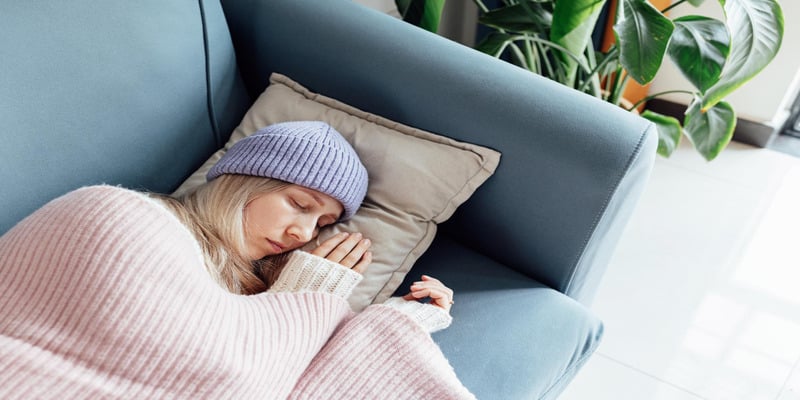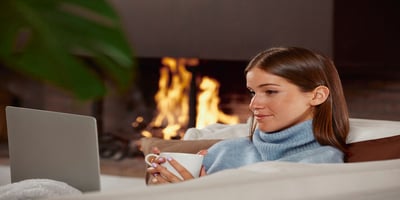What Is the Ideal Temperature for Sleeping in Winter?
Key Takeaways
- Why your body needs a cooler room in winter and how temperature affects your sleep stages.
- The exact temperature range sleep experts recommend for winter nights and why it feels counterintuitive.
- Special temperature adjustments for babies, children, and older adults that could prevent sleep disruptions.
- The hidden winter challenges that make maintaining bedroom temperature harder than summer.
- Smart strategies and technology that maintain your ideal sleep temperature automatically while saving energy.
- Warning signs your bedroom temperature is wrong and how to fix them tonight.
Winter brings cozy blankets, warm drinks, and an ongoing thermostat debate in bedrooms across the country. You might think cranking up the heat creates the best sleep sanctuary, but your body has different ideas. Balancing warmth with quality sleep can feel like a puzzle, especially when the temperature outside drops.
This guide breaks down the science behind sleep temperature, reveals the optimal range for winter nights, and gives you practical ways to maintain your ideal sleep environment without freezing or overheating.
How Does Your Body Temperature Change During Sleep?
Your body starts an interesting temperature dance about two hours before you're ready to sleep. As evening approaches, your core temperature gradually drops, signalling to your brain that bedtime is near. It demonstrates your circadian rhythm at work, the internal clock that governs your sleep-wake cycle.
During sleep, your body temperature continues to fall, dropping about 1-2 degrees from your normal 98.6°F. This cooling process reaches its lowest point in the early morning hours, right before you naturally begin to wake. Your body accomplishes this by sending blood flow to your extremities, which is why your hands and feet might feel warmer even as your core cools down.
Temperature plays a crucial role in your sleep stages. When your bedroom is too warm, your body struggles to reach the deeper, restorative phases of sleep, particularly REM (rapid eye movement) and slow-wave sleep. These stages are when your body repairs itself, consolidates memories, and recharges for the next day. Even a few degrees too hot can disrupt this process, leaving you tossing and turning through the night.
The connection between temperature and melatonin production is equally important. As your body cools, your brain releases more melatonin—the hormone that helps you fall asleep and stay asleep. A room that's too warm interferes with this natural process, making it harder to drift off and stay comfortably asleep throughout the night.
How Many Degrees Should Your Thermostat Be at Night in Winter?
The sweet spot for winter sleep falls between 60-67°F (15-19°C). This range might feel cooler than you expect, but it aligns perfectly with your body's natural temperature regulation during sleep. When your bedroom stays at this ideal room temperature during winter, you're giving yourself the best chance for uninterrupted, high-quality rest.
This comfortable sleeping temperature range works because it allows your body to cool down without fighting against an overheated environment. Think of it as supporting your body's sleep mechanisms rather than working against them. Your room should feel noticeably cooler than your daytime comfort zone that's completely normal and beneficial for sleep.
Personal preferences do vary slightly. Some people sleep best at 62°F, while others prefer 66°F. The key is staying within that general range and paying attention to how you feel. Are you waking up frequently? Do you feel too hot or too cold? These signals help you fine-tune your target temperature.
Winter conditions add an extra layer of complexity. The temperature outside might be well below freezing, but your bedroom still needs to maintain that 60-67°F range. This often means adjusting your heating system carefully rather than blasting heat all night. Several factors can affect maintaining this temperature, including insulation quality, window drafts, and heating system efficiency. Learning how these factors interact helps you create a stable sleep environment despite winter's challenges.
 How Does Age Affect Your Ideal Sleep Temperature?
How Does Age Affect Your Ideal Sleep Temperature?
Not everyone thrives at the same sleep temperature. Age significantly affects temperature regulation and comfort needs.
Infants and toddlers need a slightly warmer environment, typically between 65-70°F. Their bodies can't regulate temperature as effectively as adults, making them more vulnerable to both overheating and getting too cold. Keeping babies in this warmer range helps reduce the risk of SIDS (sudden infant death syndrome), though you should never use heavy blankets or bundle them too warmly.
Children and teens generally do well with the standard 60-67°F range. Their active metabolisms generate plenty of body heat, and they often prefer sleeping cooler. Layered bedding works particularly well for this age group, allowing them to adjust their warmth level throughout the night.
Older adults may find they need warmer temperatures, with research suggesting an optimal range of 68-77°F for this population. As we age, our bodies become less efficient at temperature regulation, and circulation changes can make us feel colder. If you're over 65, you might need to adjust your thermostat a few degrees higher than younger household members.
People with certain health conditions—including thyroid issues, circulation problems, or those going through menopause—may need personalized temperature settings that fall outside standard recommendations.
Why Is It Harder to Maintain Sleep Temperature in Winter?
Winter sleep presents unique obstacles that don't exist during warmer months. The extreme temperature difference between outdoors and indoors can make maintaining a stable bedroom temperature tricky.
Many homes become overly dry in winter as heating systems remove moisture from the air. This dry environment can irritate your respiratory system, make you feel uncomfortable, and disrupt sleep quality. The ideal humidity level for sleep sits between 40-60%, but winter heating often drops it well below that range.
Heating systems themselves create challenges. Central heating may not distribute evenly throughout your home, creating hot and cold spots. Some rooms get too warm while others stay chilly. Morning temperature fluctuations are common too—your bedroom might feel comfortable at bedtime but uncomfortably cold by dawn.
There's also the constant balance between energy costs and comfort. Nobody wants sky-high heating bills, but being too cold disrupts sleep just as much as being too hot. Achieving this balance requires both smart technology and strategic approaches to bedroom climate control.
How Can You Keep Your Bedroom at the Right Temperature All Night?
Creating and maintaining your ideal sleep temperature doesn't require complicated solutions. Here are practical strategies that actually work.
Smart Temperature Control
A programmable thermostat is your first line of defense against temperature fluctuations. Set it to drop to your target temperature about an hour before bedtime, allowing your room to cool gradually. Program it to stay steady through the night, then warm slightly before your wake time.
Smart air conditioner controllers take this concept further by offering precise temperature management without constant manual adjustments. These devices learn your preferences and automatically maintain your ideal temperature throughout the night. You can schedule temperature changes based on your sleep patterns, ensuring optimal conditions from the moment you get into bed until you wake up.
The beauty of smart climate control is its efficiency. You're not wasting energy heating your entire home to uncomfortable levels—you're creating targeted comfort exactly where and when you need it. This approach saves money while improving sleep quality, a rare win-win situation.
Bedding Strategies
Your bedding choices matter just as much as your thermostat setting. The layer method works best: start with breathable sheets (cotton or bamboo are excellent choices), add a medium-weight blanket, then keep a warmer comforter within reach for especially cold nights.
Material selection is crucial. Natural, breathable fabrics like cotton allow air circulation and wick away moisture. Flannel sheets offer cozy warmth without trapping too much heat. Avoid synthetic materials that prevent air flow and can make you wake up sweaty even in a cool room.
Weighted blankets deserve special mention. They provide comforting pressure without necessarily adding excessive heat, making them ideal for winter if you choose a breathable option. Just remember that the goal is feeling cozy without actually getting too warm.
Room Optimization
Even in winter, ventilation matters. Stale air affects sleep quality, so crack a window for 10-15 minutes before bed if possible, or use an air purifier to keep air circulating and clean. Fresh air helps prevent that stuffy feeling that makes falling asleep difficult.
Humidity control deserves attention during winter months. If your air is too dry (below 40%), consider using a humidifier. If it's too humid (above 60%), improve ventilation and adjust your heating. Maintaining that 40-60% sweet spot helps your respiratory system function better during sleep.
Blackout curtains serve double duty in winter—they block morning light that might wake you early while also providing insulation against cold windows. Heavy curtains create a buffer zone between cold glass and your room's warm air.
 What Are the Warning Signs of Poor Sleep Temperature?
What Are the Warning Signs of Poor Sleep Temperature?
Your body provides clear signals when your bedroom temperature is off. Recognizing these signs helps you adjust before sleep quality seriously suffers.
When your room is too hot
You'll likely experience night sweats, frequent waking, excessive tossing and turning, and that groggy, unrested feeling in the morning. You might wake up with your covers kicked off or find yourself seeking cooler spots on your pillow throughout the night.
When your room is too cold
Falling asleep becomes difficult as your body tries to generate warmth. You might experience muscle tension, difficulty relaxing, or frequent trips to the bathroom (your body expels more fluid when trying to warm up). Waking up with cold extremities despite warm bedding is another telltale sign.
Sleep tracking technology can reveal patterns you might not notice consciously. Consistent restlessness, increased wake time, or reduced deep sleep often correlate with temperature issues. Pay attention to these metrics—they're telling you something important about your sleep environment.
How Does Technology Help You Sleep Better in Winter?
Modern technology makes maintaining your optimal sleep temperature easier than ever. Smart climate control systems monitor real-time conditions and adjust automatically, removing the guesswork from winter bedroom temperature management.
Automated scheduling means your bedroom reaches the ideal temperature before you even get into bed. No more climbing under cold sheets or waking up in an overheated room. The system adjusts throughout the night, accounting for the natural temperature drop in early morning hours.
Energy efficiency is a major benefit. Smart systems heat only when and where needed, avoiding the waste of traditional "set it and forget it" thermostats. Many users see significant energy bill reductions while simultaneously improving their sleep quality.
Remote control capabilities add convenience—adjust your bedroom temperature from anywhere using your smartphone. Forgot to lower the heat before leaving for a winter vacation? No problem. Want to warm up your room before you wake up? Done. This flexibility helps you maintain consistent, comfortable conditions regardless of your schedule.
Integration with other smart home devices creates a complete sleep environment. Your thermostat can work alongside smart lighting, sound machines, and other devices to create optimal sleep conditions automatically. For a deeper look at finding your ideal comfort zone year-round, explore year-round temperature comfort strategies.
How Can You Start Sleeping Better This Winter?
The ideal temperature for sleeping in winter remains surprisingly cool at 60-67°F, regardless of how cold it is outside. This range supports your body's natural temperature regulation, promotes deeper sleep stages, and helps you wake up feeling genuinely refreshed.
Consistency matters more than hitting an exact number. Once you find your sweet spot within that range, maintain it night after night. Your body thrives on routine, and temperature consistency reinforces healthy sleep patterns.
Don't be afraid to experiment within the recommended range. Everyone's optimal point differs slightly based on age, health, bedding choices, and personal preferences. Pay attention to how you feel, track your sleep quality, and adjust accordingly.
Technology can be your ally in this process. Smart temperature control takes the burden off you, maintaining the right conditions automatically while saving energy and money. Better winter sleep is achievable—it simply requires getting the temperature right.
FAQ
Is it better to sleep in a cold or warm room in winter?
A cooler room (60-67°F) supports better sleep quality by working with your body's natural temperature drop during sleep. While it might seem counterintuitive during winter, maintaining this cooler range helps you fall asleep faster and reach deeper, more restorative sleep stages. You can stay warm with appropriate bedding without overheating your room.
Can sleeping in a cold room make you sick?
No, cold temperatures alone don't cause illness—viruses and bacteria do. However, rooms colder than 60°F may disrupt sleep quality and put strain on your body's temperature regulation. The key is staying within the 60-67°F range where you're cool enough to sleep well but not so cold that you're uncomfortable.
How can I keep my bedroom at the ideal temperature without high heating bills?
Use a programmable or smart thermostat to heat your bedroom only to 60-67°F at night rather than maintaining higher daytime temperatures. Layer your bedding for warmth, wear breathable sleepwear, and improve insulation with heavy curtains. Smart AC controllers optimize heating efficiency by maintaining steady temperatures without waste.
Why do I wake up hot in winter even when my room is cool?
Heat-trapping mattresses (especially memory foam), too many blankets, or synthetic sleepwear can cause overheating despite a cool room temperature. Switch to breathable materials like cotton or bamboo for both bedding and sleepwear. Also check your heating system—it might be cycling on too frequently or set too high.
Should I leave my heat on all night in winter?
Yes, but set it to maintain 60-67°F consistently rather than turning it completely off or keeping it at daytime levels. Smart thermostats can adjust automatically to maintain this range efficiently without wasting energy. Consistent temperature is better for sleep quality than fluctuating conditions.
What's the difference between daytime and nighttime temperature settings in winter?
During the daytime, most people are comfortable at 68-72°F while awake and active. At night, lower your thermostat to 60-67°F to support your body's natural cooling process during sleep. This 5-10 degree drop aligns with your circadian rhythm and promotes better sleep quality while reducing energy costs.




































.jpg?height=200&name=photo_2024-08-30_20-14-08%20(1).jpg)
.jpg?height=200&name=hot-summer-day-celsius-scale-thermometer-sand-ambient-temperature-plus-31-degrees_852890-441%20(1).jpg)
